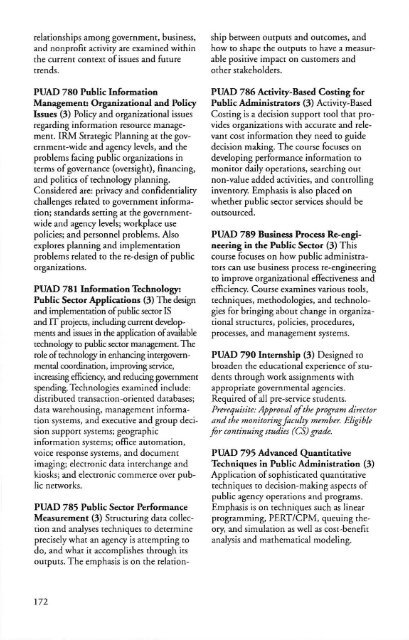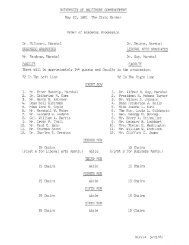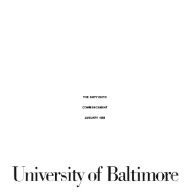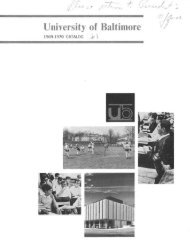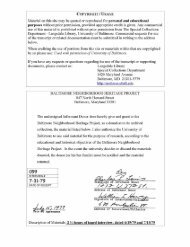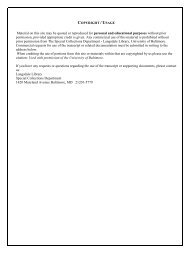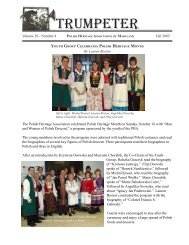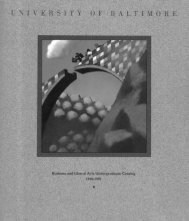2003-2005 - Special Collections - University of Baltimore
2003-2005 - Special Collections - University of Baltimore
2003-2005 - Special Collections - University of Baltimore
Create successful ePaper yourself
Turn your PDF publications into a flip-book with our unique Google optimized e-Paper software.
elationships among government, business,<br />
and nonpr<strong>of</strong>it activity are examined within<br />
the current context <strong>of</strong> issues and future<br />
trends.<br />
PUAD 780 Public Information<br />
Management: Organizational and Policy<br />
Issues (3) Policy and organizational issues<br />
regarding information resource management.<br />
IRM Strategic Planning at the government-wide<br />
and agency levels, and the<br />
problems facing public organizations in<br />
terms <strong>of</strong>governance (oversight), financing,<br />
and politics <strong>of</strong> technology planning.<br />
Considered are: privacy and confidentiality<br />
challenges related to government information;<br />
standards setting at the governmentwide<br />
and agency levels; workplace use<br />
policies; and personnel problems. Also<br />
explores planning and implementation<br />
problems related to the re-design <strong>of</strong> public<br />
organizations.<br />
PUAD 781 Information Technology:<br />
Public Sector Applications (3) The design<br />
and implementation <strong>of</strong>public sector IS<br />
and IT projecrs, including ament developments<br />
and issues in the application <strong>of</strong>available<br />
technology to public sector management. The<br />
role <strong>of</strong>technology in enhancing intergovernmental<br />
coordination, improving service,<br />
increasing efficiency, and reducing government<br />
spending. Technologies examined include:<br />
distribu ted transaction -oriented databases;<br />
data warehousing, management information<br />
systems, and executive and group decision<br />
suppOrt systems; geographic<br />
information systems; <strong>of</strong>fice automation,<br />
voice response systems, and document<br />
imaging; electronic data interchange and<br />
kiosks; and electronic commerce over public<br />
nerworks.<br />
PUAD 785 Public Sector Performance<br />
Measurement (3) Structuring data collection<br />
and analyses techniques to determine<br />
precisely what an agency is attempting to<br />
do, and what it accomplishes through its<br />
outputs. The emphasis is on the reJation<br />
172<br />
ship berween outputs and outcomes, and<br />
how to shape the outputs to have a measurable<br />
positive impact on customers and<br />
other stakeholders.<br />
PUAD 786 Activity-Based Costing for<br />
Public Administrators (3) Activity-Based<br />
Costing is a decision support tool that provides<br />
organizations with accurate and relevant<br />
cost information they need to guide<br />
decision making. The course focuses on<br />
developing performance information to<br />
monitor daily operations, searching out<br />
non-value added activities, and controlling<br />
inventory. Emphasis is also placed on<br />
whether public sector services should be<br />
outsourced.<br />
PUAD 789 Business Process Re-engineering<br />
in the Public Sector (3) This<br />
course focuses on how public administrators<br />
can use business process re-engineering<br />
to improve organizational effectiveness and<br />
efficiency. Course examines various tools,<br />
techniques, methodologies, and technologies<br />
for bringing about change in organizational<br />
structures, policies, procedures,<br />
processes, and management systems.<br />
PUAD 790 Internship (3) Designed ro<br />
broaden the educational experience <strong>of</strong>StUdents<br />
through work assignments with<br />
appropriate governmental agencies.<br />
Required <strong>of</strong> all pre-service students.<br />
Prerequisite: Approval o/the program director<br />
and the monitoringfoculty member. Eligible<br />
for continuing studies (CS) grade.<br />
PUAD 795 Advanced Quantitative<br />
Techniques in Public Administration (3)<br />
Application <strong>of</strong> sophisticated quantitative<br />
techniques to decision-making aspects <strong>of</strong><br />
public agency operations and programs.<br />
Emphasis is on techniques such as linear<br />
programming, PERTICPM, queuing theory,<br />
and simulation as well as cost-benefit<br />
analysis and mathematical modeling.


